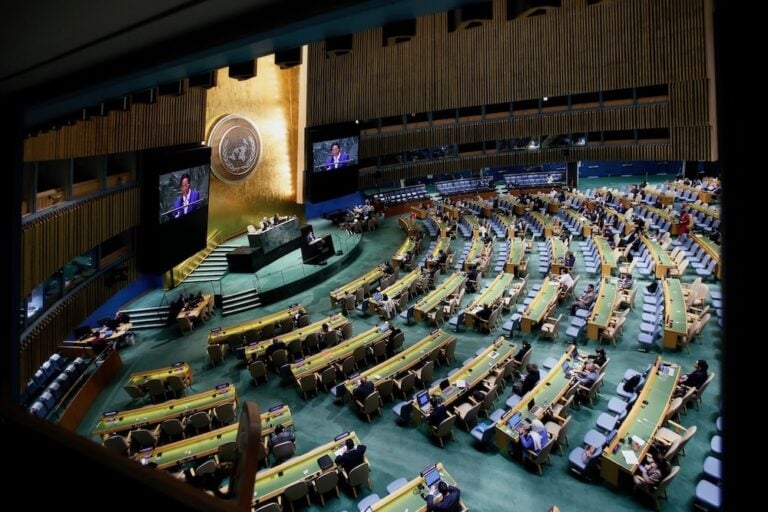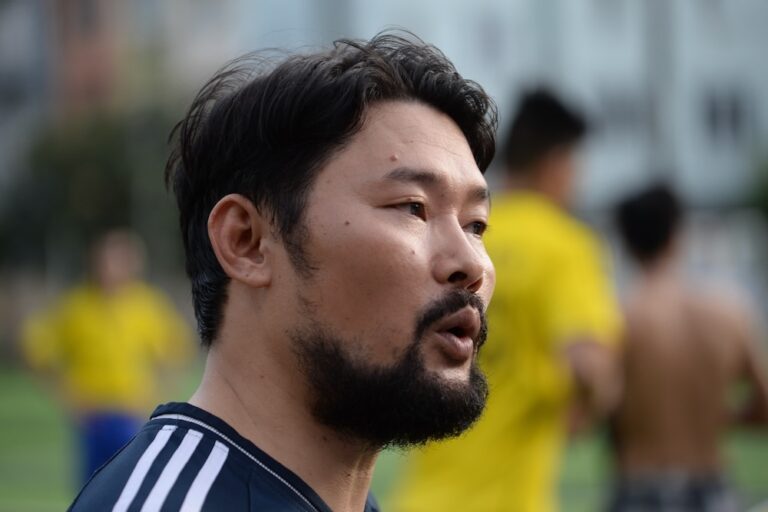(WiPC/IFEX) – The following is a 12 February 2003 WiPC press release: INTERNATIONAL P.E.N. WRITERS IN PRISON COMMITTEE CAMPAIGN ON FREEDOM OF EXPRESSION IN VIETNAM February/March 2003 The Writers in Prison Committee of International PEN is launching a campaign on freedom of expression in Vietnam on 17 February 2003 as a result of the recent […]
(WiPC/IFEX) – The following is a 12 February 2003 WiPC press release:
INTERNATIONAL P.E.N.
WRITERS IN PRISON COMMITTEE
CAMPAIGN ON FREEDOM OF EXPRESSION IN VIETNAM
February/March 2003
The Writers in Prison Committee of International PEN is launching a campaign on freedom of expression in Vietnam on 17 February 2003 as a result of the recent intensification of the repression of the right to write by the Vietnamese authorities. The campaign will focus on the ten writers in prison or under house arrest on our current caselist: Nguyen Dinh Huy, Le Chi Quang, Le Dinh Nhan (Thich Huyen Quang), Nguyen Van Ly, Nguyen Vu Binh, Pham Hong Son, Bui Minh Quoc, Dang Phuc Tue (Thich Quang Do), Tran Van Khue and Nguyen Xuan Tu (Ha Si Phu).
BACKGROUND TO THE ARRESTS OF WRITERS
In spite of promises to accelerate the process of political reform made by Nong Duc Manh upon his appointment as general secretary of the Vietnamese Communist Party in 2001, Vietnam’s human rights record remains a cause for serious concern. Many of those critical of the authorities’ stances on democracy, human rights and religious freedom have been arrested or remain closely monitored.
CRACKDOWN ON INTERNET WRITERS
Since the start of 2002 the Vietnamese authorities have been staging a crackdown on the use of the internet as a means to promote freedom of expression and information, leading to the imprisonment of at least five dissidents. In June, the Prime Minister instructed the Ministry of Culture and information to tighten up controls at Vietnam’s four thousand public internet cafés to prevent customers from accessing ‘state secrets’, ‘pornography’ or ‘reactionary documents’, and the government blocked approximately two thousand websites.
In August, the Ministry of Culture and Information ordered the closure of the popular Hanoi-based website ttvonline.com for operating an internet site without official permission and publishing articles ‘contrary to the spirit’ of the Press Law. On 16 August 2002, the Ministry announced that penalties would be imposed on internet café owners who allowed customers to view websites harmful to national security or that displayed ‘depraved’ or ‘reactionary’ content, and in October the Ministry of Culture and Information ordered Vietnam’s state-owned internet service providers to block politically and morally unacceptable web content.
The following internet writers have been persecuted for publishing their views online:
Le Chi Quang: Sentenced to four years’ imprisonment and three years’ house arrest on 8 November 2002 for publishing an essay entitled “Beware of Imperialist China” on the internet.
Tran Van Khue: Under house arrest following the online publication of an open letter to Chinese President Jiang Zemin in February 2002.
Nguyen Vu Binh: Arrested on 25 September 2002 following the online publication of an essay entitled “Some Thoughts on the China-Vietnam Border Agreement.” Not yet sentenced.
Pham Hong Son: Arrested on 27 March 2002 following the publication of several essays promoting democracy and human rights on Vietnamese-language websites. His sentence remains unknown.
Nguyen Van Ly: Arrested on 17 May 2001. Sentenced to fifteen years’ imprisonment and five years’ probationary detention for publishing a written testimony “Violations of Human Rights in Vietnam” on the internet.
Territorial concessions
“Following the end of the Vietnam War, in late April 1975, relations between China and Vietnam began to deteriorate over a number of issues, not least of which [centered] on border disputes. The situation came to a head with the Chinese military campaign against Vietnam in February and March 1979. Bilateral negotiations in 1979 and the early 1980s failed to bring the two parties to any agreement on the many disputed issues. Following a slow normalisation process that began with low-level contacts in the mid-1980s, expanding to high-level meetings by the end of the decade, and gaining momentum from mid-1991, the bilateral relations were officially fully normalised in November 1991. China and Vietnam finally signed a Land Border Treaty on 30 December 1999.” [Taken from “The Management of the Border Disputes Between China and Vietnam and its Regional Implications”, Assoc. Prof. Ramses Amer]
Following the territorial agreements, dissidents visited the China-Vietnam border and proceeded to issue public critiques of the authorities accusing the Vietnamese government of conceding too much territory. This led to several arrests. The first was that of journalist Bui Minh Quoc who was placed under house arrest on 12 January 2002 following an investigation he led concerning territorial concessions. This was followed by the arrest of writers Tran Van Khue, Nguyen Vu Binh and Le Chi Quang, whose views were published on the internet.
Promotion of democracy
A growing number of dissidents are calling for multi-party reforms in Vietnam to counter Vietnam’s one-party system. The electoral process is currently controlled by the VCP, which screens and approves all electoral candidates. In the elections of February 2002 only fifty-one of the 498 National Assembly seats were won by non-VCP candidates.
A number of democracy activists were detained for their writings in 2002. Pham Hong Son (see internet writers) was arrested on 27 March 2002 for circulating the translation of an article entitled “What is Democracy?” In July and August 2002 a group of prominent dissidents sent petitions to the government protesting the treatment of fellow dissidents and calling for democratic reforms. Nguyen Vu Binh, arrested in September 2002 for protesting border accords (see above), was originally arrested on 21 July 2002 following the publication of an open letter to the government on 16 July calling for political reform and the release of political prisoners.
Numerous other democracy activists were detained prior to 2002 and remain in prison. Nguyen Dinh Huy, a former newspaper editor and leading figure in the pro-democracy organisation Movement for National Unity and Building Democracy, was arrested on 17 November 1993 and has been in prison for almost a decade, serving a fifteen-year sentence for planning an “illegal meeting”, an “international conference for development with Vietnam”. Writer and biologist
Nguyen Xuan Tu (pen name Ha Si Phu) was placed under house arrest in February 2001 for making contact with “reactionaries living abroad”. He is reported to be held in total isolation, with all mail censored and no telephone communication allowed.
Religious freedom
The Vietnamese population is officially allowed religious freedom in accordance with the 1992 Constitution:
Article 70
“The citizen shall enjoy freedom of belief and of religion; he can follow any religion or follow none. All religions are equal before the law. The places of worship of all faiths and religions are protected by the law. No one can violate freedom of belief and of religion; nor can anyone misuse beliefs and religions to contravene the law and State policies”.
However, only six closely monitored religious organisations are allowed by the government. Vietnam’s rulers are regularly criticised by human rights observers for religious repression, including that of ethnic minority Christians in the northern and central highlands, members of the banned Unified Buddhist Church of Vietnam (UBCV), and Hoa Hao Buddhists in the south. Furthermore, at the beginning of 2003, the Communist Party of Vietnam resolved to increase state control over religious affairs in an effort to reduce ethnic unrest and dissent. It called on religious followers to foil attempts to undermine the regime by “hostile forces”.
Those detained for their writings on the restriction of religious freedom include Le Dinh Nhan (religious name Thich Huyen Quang), acting head of the outlawed UBCV, arrested on 29 December 1994 and held under house arrest for the publication of an open letter criticising government policy on freedom of speech and religious expression. Nguyen Van Ly (see internet writers), a priest, scholar and essayist, was arrested on 17 May 2001 and sentenced to fifteen years’ imprisonment and five years’ probationary detention for publishing a written testimony entitled “Violations of Human Rights in Vietnam” and writing to a United States Congressional Committee urging lawmakers not to ratify bilateral trade agreements until Hanoi agreed to loosen religious restrictions. Dang Phuc Tue (religious name Thich Quang Do), Buddhist monk, writer, scholar and secretary general of the UBCV, was arrested on 1 June 2001 and sentenced to two years, three months’ house arrest for announcing his intention to escort Thich Huyen Quang to Ho Chi Minh City for medical treatment.


